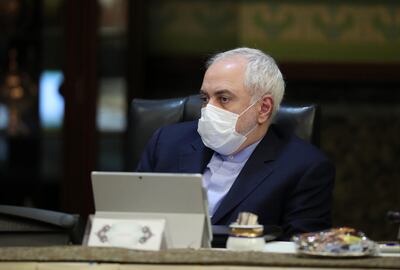The US on Saturday issued an executive order to reimpose UN sanctions on Iran, five years after they were abandoned under the nuclear deal between Tehran and global powers.
US Secretary of State Mike Pompeo said the sanctions were re-introduced because Iran "failed to perform" its requirements from the 2015 accord.
He said the UN Security Council failed to extend the UN arms embargo on Iran, which has been in place for 13 years and is set to expire in mid-October.
He said that not extending the embargo would give Iran the power to "buy all manner of conventional weapons on October 18" and that the US signed an order to extend it.
"Fortunately for the world, the United States took responsible action to stop this from happening," he said.
"In accordance with our rights under UNSCR 2231, we initiated the snapback process to restore virtually all previously terminated UN actions, including the arms embargo. The world will be safer as a result."
Mr Pompeo said the sanctions would go into effect immediately.
He said the US would announce more measures to strengthen UN sanctions and hold those who breached regulations accountable.
The US withdrew from the nuclear accord with Iran in 2018, after US President Donald Trump said the agreement was a terrible giveaway to Tehran.
The sanctions decision comes during the 75th session of the UN General Assembly in New York, a event that began on September 15 and will continue through to October.
On September 18, Britain, France and Germany said the sanctions, which the UN suspended after the signing of the 2015 nuclear deal, would have no legal effect.
The European nations said they would work to preserve the 2015 accord.
On Saturday, Iranian Foreign Minister Javad Zarif said global powers should oppose the use of sanctions by the US or expect to face sanctions themselves.
“The Americans as a rule act as a bully and impose sanctions. The world community should decide how to act towards bullying,” Mr Zarif told Iranian state TV hours before the announcement in Washington.
"As they [other countries] will face the same thing tomorrow when America takes the same action towards the Nord Stream project, as well as other projects because a bully will continue to act as a bully if he is allowed to do it once."
The US and many European countries oppose the Nord Stream 2 pipeline, which they say will increase Europe's reliance on Russian gas.
Meanwhile, the chief of Iran's Islamic Revolutionary Guard Corps rejected any possibility of war with the United States as a bluff.
"No power, including the United States, has the conditions to impose a new war on the Iranian nation, so people should not worry about these exaggerated bluffs by the US president,"Hossein Salami said, according to the semi-official news agency ISNA.
"Even if the [sanctions] snapback is performed, it will fire blank shots.
“We will go ahead and take our actions if our rights are not fulfilled within the nuclear deal. We’re not afraid of bluffs, threats and intimidations.”
Mr Salami was apparently reacting to a tweet from Mr Trump in which he said any Iranian attack against the US would be met by a response "1,000 times greater in magnitude".
Mr Salami claimed the threat was an “unbelievable exaggeration".
He also rejected reports published last week that said Iran was planning to assassinate the US ambassador to South Africa, claiming Tehran would not target anyone unless they were involved in the killing of top Iranian commander Qassem Suleimani.
Suleimani, Iran’s most senior military general, was killed in January in Baghdad by a US drone strike.


